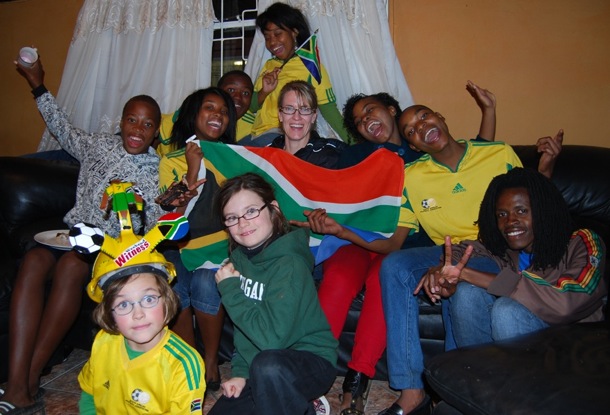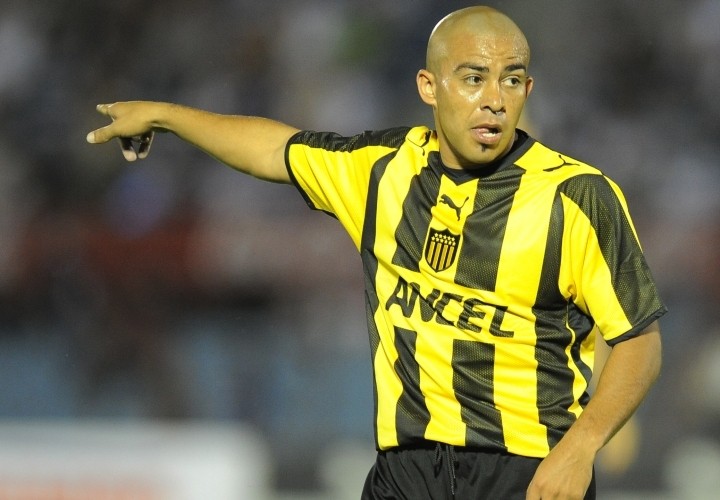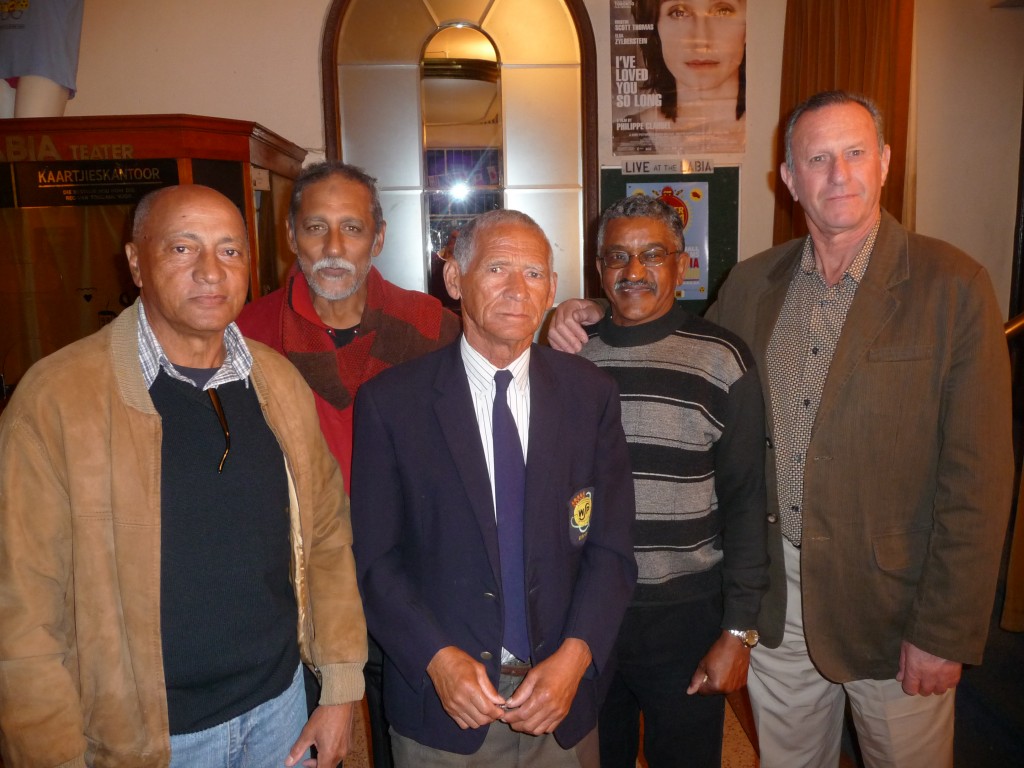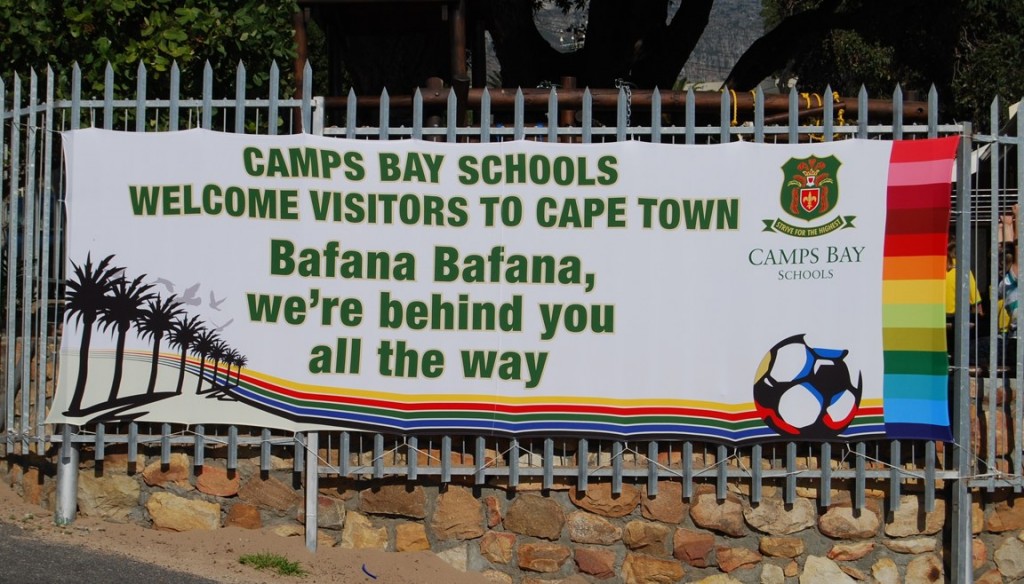
After two days of rain, a bright sun ushered in June 11, 2010: opening day of Africa’s World Cup. A neighbor was vuvuzela-ing at 7am. The girls played soccer outside while we did some chores around the house. Ate an early lunch, donned our makarapas, team shirts, vuvuzelas, grabbed a flag and headed out.
Thabo met us on campus to take us to Imbali township where he lives. Driving in the Izichwe Youth Football microbus, and joined by four Norwegians from Viking Stavanger Football Club (established in 1899) — one of the Izichwe sponsors — we joined the steady flow of ‘Proudly South African’ vehicles, wailing goats (aka vuvuzelas), drivers on cellphones and distracted cops. “I’ve never seen Pietermaritzburg like this,” said Thabo; “It’s like Christmas has arrived early!”
15 minutes later we were in Imbali, the largest black township in the city. The place was buzzing with excitement. The public viewing area was set up at the football ground of the Indumiso campus of the Durban University of Technology. A single covered grandstand, mostly grass pitch, and a stage and big screen in front of one of the goals. My daughters and I took the ball out and our impromptu game immediately attracted several local boys.
A wonderful a cappella group in Bafana jerseys performed, followed by a group of older women dancers and local kwaito stars BIG NUZ. Then something strange. As Bafana and Mexico stood solemnly on the pitch at Soccer City the crowd of several thousand in Imbali drowned out the national anthem courtesy of the infernal vuvuzelas. Shame!
A few minutes into the game we left for the comfort of our host’s home in the township’s oldest neighborhood, where in the 1980s the police battled the United Democratic Front against apartheid. We had a blast watching with Thabo’s family and friends (see photo). Exploded with joy at Tshabalaaaaala’s perfect strike early in the second half. Neighbors dancing in the street! Is a South African miracle about to happen?
Sadly, no. Captain Mokoena’s tired legs kept Marquez on side and the experienced Barcelona center back coolly finished his chance. 1-1. One more palpitation: Mphela hit the post with a minute left. Sho! Despite the disappointment, the consensus was that the draw was fair. Bafana are undefeated! As we drive off later that evening, the shebeens (taverns) are doing a roaring business, but for street carnivals we’ll have to wait for Uruguay on Youth Day, June 16 — the 34th anniversary of the Soweto Uprising.
The Pre World Cup Bevy

It was my aim to dispatch a report from some bar full of Uruguayans before the match in Cape Town yesterday. But in age old football supporter tradition, I was late.
South Africa is a serendipitous place. And proper South African football supporters tend to be late too. Before I could figure out my next move, my name was being called. It was Shirley out on the wing (across some Dutch named street I could not pronounce), waving at me, asking for the pass, and gesticulating toward the rest of the girls in the box. Shirley was going to whip one in. “We are to going to help Bafana score a goal”, she said. Yebo, Ladies! (*Shirley and Co. have been my regular healthy lunch spot hosts in Cape Town. It was only proper that I be in their company during their afternoon off.)
But first must come the pre match bevy. The Banyana like their cider. And I was honoured for it to be my shout. Shirley claimed to know just about every manager and cashier in the corner Spar. We jumped the queue. Eventually a large lady in a tracksuit, a sort of South African Fatty Foulkes, stepped in to ensure democracy at the entrance to the Spar. I won’t share what Shirley had to be say about her. It was X Rated Football language!
Uruguay’s Opening Gambit

The wires are reporting Oscar “El Maestro” Tabarez has already named his Uruguay team for the opening match against France on Friday. This is a classic opening gambit designed to take advantage of current French insecurities.
The French don’t know what they are doing in South Africa. “El Maestro” has just signaled the Uruguayans do. “The system we have chosen can adapt to the different things we could face against France,” said “El Maestro”.
Mauricio Victorino who plays for Universidad de Chile and midfielder Egidio Arevalo Rios (pictured above) who enforces the midfield for Penarol in Montevideo, are solid squad players, but not stars. So what is behind El Maestro’s opening gambit? What is he really saying by including Vicotorino and Rios? What is he really up to?
The reflex among some Uruguayan commentators and bloggers is to express disbelief and sigh. But El Maestro is thinking deep here, which is what he has to do if Uruguay are going to go deep into the tournament and win the World Cup.
Uruguay do not need stars to beat France is also the message here.
Melissa Block of NPR’s ‘All Things Considered’ interviewed me about soccer’s long history in Africa. Soccer was brought to Africa by British colonials in the mid-1800s. The first documented game on the continent was played in South Africa in 1862, a year before soccer’s official rules were codified. As I argue in African Soccerscapes, soccer has been an important sport in Africa for as long as it was played in Europe.
Click here to listen to the interview and read a transcript.
Was also interviewed by and quoted in this New York Times article: Soccer Returns to its Roots in Africa

Cape Town Spurs from the 1940s, 1950s, 1960s, and 1970s.
From L to R: Stan Mini, Hassien Ryclief, Arthur Botha, Yusuf Davids and Frank Adams
I was privileged to be in the company of some of the greats of Cape Town football last Saturday night. The five footballers (pictured above) were guests at the Opening Night of “Soccer Cinema” in Cape Town. “Maradona” by Emir Kusturica topped the bill.
A Serbian Jazz Quartet made intimate interviews almost impossible, though I did get Stan Mini to share the moment Apartheid ended football for him (see below). I won’t be upoading the interview I conducted with the legendary Arthur Botha. You can’t hear the man. I had asked Arthur if had ever played with anyone as flamboyant and masterful as Maradona. Arthur shook his head. “No, no. No one like that in our day”, he said. Then one of the other players interjected, asking Arthur about Basil D’Oliveira. The crimes and passions of football from back in the day suddenly splashed all over Arthur’s face. “Ah, yes, Dolly“, said Arthur. Dolly was Diego material, though he choose to take Cricket to that higher level, and did so in the teeth of apartheid and against apologists of the time. “I played with him, you know, and against him, too”, said Arthur. He went on, “Dolly and I grew up together. We’re great friends.”
Hassien Ryclief shared with me his chopping methods for dealing with Albert Johansson. Yusuf Davids said he “proud” of today’s Bafana Bafana, but will miss Benni McCarthy. Stan Mini agreed, but the twinkle in his eye suggested he was looking forward to seeing younger players get their chance. The stalwart of the Cape Town Spurs back line, Frank Adams, believes Alberto Parreira has Bafana Bafana primed and ready.
Later I watched the men watch the younger generation dance to more of that Serbian Jazz. It was the wee small hours, deep into injury time of Cape Town’s Indian Summer. No substitutes were needed.
It’s a scene every schoolboy remembers. A game of football is about to begin. Who plays against who? Who picks the sides? We all wanted to be on the side as our mates. We waved to impress the nominated Captains, though we were never quite sure how they became Captains. And why did some fool suggest the teams be divided by shirt colour on the very day you choose to wear a black shirt and the Maradona of your neighbourhood is decked out in white!
Stan Mini, a former Cape Town Spurs player, shares the moment when Apartheid and the social engineering of team selection forced him to walk away from the game. (We also hear how his team mate, the legendary Frank Adams, a defender by trade, was placed into an attacking role when the Cape Town Spurs took the bus to away games. Frank was a white man and always sure to get good service.)
Worldview: SA 2010 (radio)

Did an interview on the ‘Worldview’ program of Chicago Public Radio station WBEZ. Interviewers Euan Hauge and Dan Shalin asked me what’s happening in SA at the moment? What are people talking about? Is the 2010 World Cup a case of the rich getting richer? What about forced removals disguised as urban renewal and the Nelspruit stadium mess? Is this really Africa’s World Cup? How will the African teams do in the tournament?
Listen to the interview here: http://audio.wbez.org/wv/2010/06/wv_20100604.mp3
